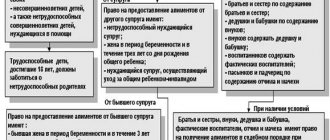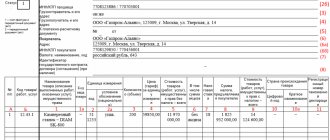Conditions for assigning child support for a child under three years of age
They are not particularly different from the conditions that are observed when assigning alimony for the maintenance of children of a different age.
If one parent does not live together with his child, does not take part in his upbringing, and does not spend money on his maintenance, he is obliged to pay alimony.
Whether they will be paid by mutual agreement of both parents, by court order or writ of execution is not important.
The basic rule: they must be paid monthly and in a set amount - in a fixed amount or as a share of the total income of the alimony payer.
How to collect
After the court decision is made, you will be able to obtain a writ of execution. Please contact the bailiffs with these documents. They will initiate proceedings in your case and oblige your spouse to pay alimony.
It is best to agree that payments are made to a bank card, for example, from Sberbank. This method is very convenient for reporting and control.
If a spouse refuses to fulfill his obligations voluntarily, more serious methods may be applied to him, including criminal liability.
Conditions for assigning child support to the mother of a child under 3 years of age
Article 89 of the Family Code of the Russian Federation talks about the obligation of spouses to financially support each other. If one of the spouses has the opportunity, but refuses to provide this help to the needy - the second spouse, that is, for example, if the father does not pay alimony, the wife will be able to demand alimony from him in court. Important conditions must be met:
- the needy spouse must be disabled;
- this is a pregnant woman;
- this is a needy spouse raising a child under three years old;
- a spouse caring for a common disabled child of group 1 for life, or a disabled child of group 2-3, until he reaches the age of eighteen.
But the main condition is that the spouse (or former spouse) must be legal, and not civil.
Legislative basis
All issues related to alimony are regulated by Chapter 13 of the Family Code of the Russian Federation. So, according to Art. 90 of the RF IC, the former spouse pays cash payments to the second parent in the event of:
- maternal pregnancy;
- failure to reach 3 years of age with a common baby.
Important!
During pregnancy or raising a child under 3 years of age, the mother cannot earn a living on her own, since she spends quite a lot of time preparing for the birth of an heir or raising him. Download for viewing and printing: Family Code of the Russian Federation No. 223 Federal Law ed. 12/30/1995
Child support for a child under three years of age and for his mother
Do you know that
If the ex-wife (mother of a common child) remarried, even if the court recognized her as needy and disabled, alimony payments are terminated. Thus, the ex-spouse is no longer required to pay to support his ex-wife.
We said above that alimony for a child under three years of age is no different from alimony for children of a different age or alimony for adopted children.
Also, the spouse who cares for such a child will be able to demand alimony. More often this is a mother who is on maternity leave. With all this, this parent must be in need, that is, due to the child’s young age, he does not have the opportunity to work and raise funds to support the child and himself.
It is no secret that it is difficult to raise a child on the allowance that our mothers on maternity leave receive. And even coupled with child support, this amount is not always enough to ensure that the child eats normally, is clothed and has shoes.
The issue of collection and amount of such alimony can be resolved by concluding a voluntary agreement with the second spouse. Or by filing a claim in court. It will also be necessary to prove to the court that the spouse caring for a child under three years of age actually needs additional support. The court will also examine the financial situation of the second spouse.
We must not forget that, according to Article 90 of the Family Code of the Russian Federation, the mother of a child under three years of age has the right to demand alimony for her own maintenance, subject to a difficult financial situation, but this obligation does not automatically arise for the father of the child. The wife will be able to collect alimony for herself after filing a corresponding demand.
Amount of child support for a child under three years of age
It is calculated in the same way as the amount of child support for a child of a different age. And it can either be specified in a voluntary agreement concluded by the parents, or established by the court in fixed monetary terms or in a certain proportion of the total income of the person obligated to pay child support:
- up to 25% - for one child,
- up to 33.33% - for two children,
- up to 50% - for three or more children.
When setting the amount of the monthly payment, the court must examine the financial situation of both parents. It also takes into account the calculation of child support costs provided by the plaintiff.
Amount of child support for the mother of a child up to three years old
The plaintiff - in our case, a mother raising a child under three years of age, will be able to indicate in his application the amount of alimony that he would like to receive for his maintenance. With all this, he must take into account that according to the law, no more than 50 percent of the amount paid for the maintenance of the child can be recovered from the second parent.
Example: if a father pays child support in the amount of 10,000 rubles monthly, then he will be required to pay no more than 5,000 rubles for the maintenance of his mother. This is due to the fact that, according to Russian family law, child support is the responsibility of both parents equally. Therefore, the costs for it should be divided equally.
This is precisely what is connected with the method of paying alimony to the wife in hard monetary terms and nothing else.
From what income can child support payments be deducted?
To properly fulfill alimony obligations, it is necessary to determine from what income the payer will be required to make deductions. Their list is quite large, but not all amounts received by the alimony payer can be taken for calculation.
A complete list of types of wages and other income from which alimony payments can be recovered is indicated in Decree of the Government of the Russian Federation dated July 18, 1996 No. 841.
Alimony may be deducted from the following types of wages:
- Salary for fulfilling your work obligations (salary, piecework).
- Various bonuses and allowances to the basic salary (for existing qualifications, for working on holidays or night shifts, for temporary fulfillment of other obligations, for length of service, etc.).
- Additional pay for working in difficult conditions.
- Bonus payments (per month, quarter, year).
- Vacation payments, or monetary compensation for unused vacation.
- Providing for persons in public service.
- Fees for writing articles and books.
- Various remunerations for teaching staff and doctors.
If an employment contract is concluded between the employee and the employer, which provides for any other payments for work activities, then they will be taken into account when deducting alimony. Income may not only consist of wages at the place of work .
Income may not only consist of wages at the place of work. Payments subject to withholding of alimony payments also include:
- Various types of pensions, taking into account regular additional payments to them. The exception is the survivor's pension; it is not taken into account.
- Scholarships paid to students of universities and professional educational institutions.
- Benefits for temporary disability and unemployment, if such a decision is specified in the writ of execution.
- Income from business activities.
- Income from the rental of real estate or other property on a rental basis.
- Income from the sale of copyrights.
- Payments to doctoral students.
- Monetary support for military personnel and employees of internal affairs bodies.
Alimony is withheld from any type of income of the payer only after deducting tax liabilities (clause 4 of the Decree of the Government of the Russian Federation of July 18, 1996 No. 841).
All of the above income can be classified as official, that is, those that can be documented. But often the parent has a good income, but is not registered under an employment contract, and, accordingly, there is no evidence that he has it. In such cases, the recipient of alimony may apply to the court to collect payments in a fixed amount.
Registration of alimony and necessary documents
Alimony for a child under three and his mother can be issued:
- notarized (when an agreement on the payment of alimony is concluded between the parents);
- under a court order for the payment of alimony;
- on a claim for alimony.
The main condition for an alimony agreement between former spouses is notarization. If this condition is not met, then there is a possibility that the agreement will be invalidated.
Documents required for registration of alimony for wife and child:
1) passport of the plaintiff,
2) the child’s birth certificate or
3) a certificate from the antenatal clinic indicating the duration of pregnancy,
4) certificate of marriage (if the marriage has not yet been dissolved),
5) certificate of divorce (if the marriage has already been dissolved) (read more in our article about filing a divorce if you have children),
6) certificate from the defendant’s place of residence,
7) information about the lack of income or low income of the child’s mother (certificate from the place of work about being on maternity leave, a certificate from social security about the amount of benefits, etc.).
All these documents, as well as their copies, are provided to a notary (when there is a voluntary agreement between the spouses), a magistrate in order to obtain a court order, or are attached to the statement of claim for the recovery of alimony.
Stages of registration
Registration is carried out in the following stages:
- Notarized.
- By court order.
- According to the claim.
Voluntary agreement
A notarial agreement is concluded between the parents.
The document specifies the conditions and amount of financial assistance. Important! This agreement is concluded by mutual consent. If one of the parties to the contract does not agree with any term of the agreement, then the issue must be resolved in court. In order for a notarial agreement to gain legal force, it must be certified by a notary. His responsibilities include not only checking the correctness of the agreement, but also explaining the responsibilities and rights of each party, the risks, as well as the consequences that may arise in connection with the implementation of this agreement.
Required documents
The following documents are required for notarization of the agreement:
- passports of the parties to the agreement;
- certificate of registration or dissolution of a family union;
- a certificate confirming the fact of the birth of the baby;
- certificate of family composition;
- certificate confirming income.
Statement of claim
If the former spouses cannot agree on the amount of compensation, it is necessary to go to court . The claim and the necessary package of documents are submitted:
- at the location of the defendant;
- at the plaintiff's registered address.
Important!
Magistrate judges deal with cases of awarding compensation. If the lawsuit is satisfied, the plaintiff is issued a writ of execution. This document must be submitted to the FSSP in order to initiate the procedure for collecting financial assistance.
Court order
The court order completes the process of obtaining this financial benefit for the mother of the baby. This process takes place in the following stages:
- the mother draws up and submits a statement of claim to the territorial magistrate court;
- within 5 days the court is obliged to consider the claim and the provided package of documents;
- the plaintiff receives a decision, which must be submitted to the FSSP within 3 years after receiving such a decision.
To apply for compensation in court, you must present the following documents:
- statement of claim;
- document confirming the identity of the plaintiff;
- certificate of registration or dissolution of marriage;
- a certificate confirming the fact of the birth of the baby;
- certificate of the applicant's family composition.
Collection procedure
If an agreement on the payment of alimony has been concluded between the parents, and it is certified by a notary, then you can immediately contact the bailiff service with it. This agreement is already binding, and alimony can be collected under it. If the agreement has not been notarized, you will need to additionally contact a notary to comply with the entire procedure.
If the plaintiff knows for sure where the defendant lives and works, he will be able to go to the magistrate’s court and write an application to obtain a court order for alimony. After considering this application, the magistrate will issue this order, in which he will determine the amount of alimony in accordance with family law. With this court order, you can already go to the bailiff service, which will collect alimony from the debtor.
If the second parent does not agree to fulfill his obligation to pay alimony for the maintenance of the child and his mother, the first parent has no choice but to draw up a statement of claim and submit it to the magistrate’s court to resolve the existing dispute. We talk about how and where to properly apply for alimony here - https://divorceinfo.ru/2349-kuda-kak-podat-zayavlenie-na-alimenty-posle-razvoda-suprugov
Also, only by filing a statement of claim in court will it be possible to resolve the issue of assigning alimony in a fixed amount. And both for the child and for his mother. But in the second case, the judge will additionally need to submit papers confirming the costs of maintaining a child under three years of age and his mother and prove the need to assign a specific amount of alimony.
After considering the claim, the judge decides to issue a writ of execution. Based on it, bailiffs will be able to begin work on collecting funds from the alimony payer.
Court order
To immediately start receiving payments and not have to hold court hearings, you can file an application for a court order and take it to court.
After 5 days, you will be given an order, which you can take to the bailiffs or the employer of the alimony payer. You can download the application from the link below.
Below you can see how to fill out a court order.
Mother is not entitled to child support
There are several cases when a spouse who does not want to pay alimony for the maintenance of the mother of his child will be able to avoid this obligation:
- the marriage lasted a short time (less than a year, etc.),
- unworthy behavior of the spouse in marriage, which served as a reason for divorce (infidelity, drunkenness, etc.),
- the spouse became incapacitated due to her own fault (committing a crime, getting injured while drunk, etc.),
- it will be proven that the spouse is hiding the real amount of her income in order to receive alimony.
Cancellation of alimony for the maintenance of a spouse (former spouse) can be achieved at any time by proving that her financial situation has changed and improved in comparison with the income of the payer. There are also some situations in view of which the amount of alimony can be reduced - more on that on the page.
If you still have questions about how alimony is paid for the maintenance of a spouse until the child is 3 years old, then ask them in the comments
Form of claim for the recovery of alimony for the maintenance of a former spouse
Loss of the right to receive alimony from the husband
In addition to the key points that initially do not give the wife the right to demand alimony for her maintenance, there is a list of rules under which payments to the spouse are terminated:
- The woman returned to work from maternity leave;
- The child has reached the age of 3 years;
- The wife's health improved and her disability was removed;
- The woman entered into a new marriage;
- The death of one of the parties.
A man cannot voluntarily stop paying alimony to his ex-wife for her maintenance simply because he knows about a change in her life situation. If the court ordered payments before a certain period, the obligations are considered fulfilled upon the expiration of the period. But in a situation where alimony obligations are indefinite, the man must file a lawsuit and prove that his ex-wife no longer needs his support.









